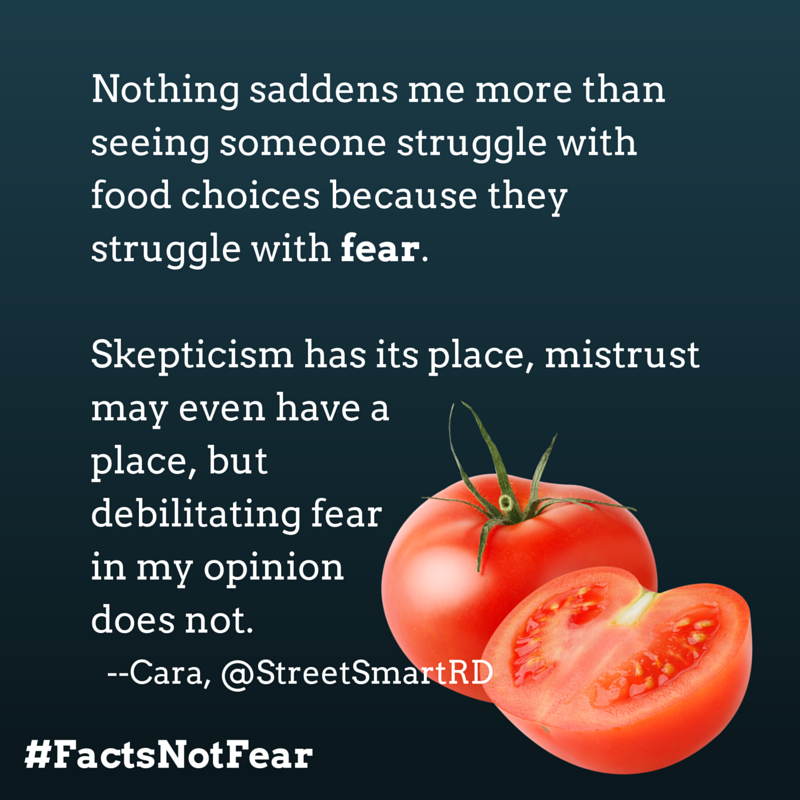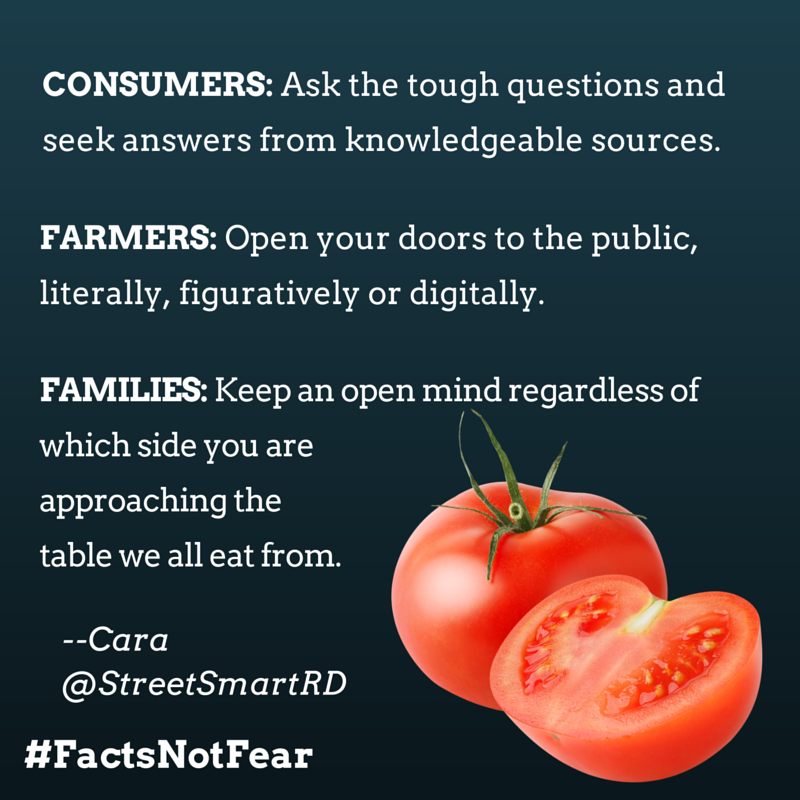By Cara Harbstreet on May 24, 2016
Put your (pitch) forks down and let's talk

Recently I had the unique opportunity to step into the belly of the beast. The front doors of Monsanto headquarters in St. Louis, Mo. shone brightly in the morning sun. Passing over the threshold landed me in a place few people I know have been able to venture. In my world of dietetics and nutrition, as in other communities across the nation, the topic of biotechnology, plant breeding, food science and the world of GMOs can be more divisive than almost any other topic.
It’s not something openly or comfortably discussed in the circles I run in, but I’ve always questioned, “Why?” I suspect that fear, apathy, ignorance, disconnect, misunderstanding or any combination of the above contributes to our separation from the food we eat and the technology it takes to get it to our tables. I’ve always loved to learn and while keeping an open mind has been a struggle at times, doing so landed me on the #FarmFoodTour in May.
#FarmFoodTour: Let’s Talk Biotech!
My travel partners included fellow dietitians and food and family bloggers from across Kansas and the Midwest region. Our tenacious hosts included Kansas Pork Association, Kansas Soybean Commission and Kansas Farm Bureau. Meeting us in the open lobby of Monsanto headquarters were members of its outreach team. We had made it – and so far, the earth had not spun off its axis.
 Our time at Monsanto headquarters included a tour of various facilities and buildings, an overview of plant breeding, genetics and innovative technologies, and several panels featuring health experts and farmers in the region. By the end of the day my brain was buzzing, but in a good sense. I was full of more questions, as it often happens when you open Pandora’s box. I was excited about what I had learned and excited to keep the conversation going.
Our time at Monsanto headquarters included a tour of various facilities and buildings, an overview of plant breeding, genetics and innovative technologies, and several panels featuring health experts and farmers in the region. By the end of the day my brain was buzzing, but in a good sense. I was full of more questions, as it often happens when you open Pandora’s box. I was excited about what I had learned and excited to keep the conversation going.
The purpose of the #FarmFoodTour was not to exploit the inner workings of Monsanto or convert me into a paid industry shill (a common defensive term used toward those standing up for science in the social media universe). Rather, the goal was to illustrate the complicated inner workings of our agriculture and food system.
We also visited Merck Animal Health (located in De Soto, Kan.) and Central Missouri Meat & Sausage (a processing facility located in Fulton, Mo.). On a previous farm tour, I was able to travel as far as Chicago and Indiana to learn more about dairy, hog, soybean and corn operations.
Suffice it to say that these opportunities to learn would not have been afforded to me had I not kept an open mind. As someone who follows a flexible diet, I choose what I do or do not eat based on a multitude of reasons, but I can confidently say that fear is not one of them.
Each of these parts is just one cog in the wheel that provides the things I consume every day. I started thinking beyond just the food I eat; it encompasses the clothes I wear, the fuel in my car and countless other goods that make my life in a privileged first-world country a reality.
The interconnectedness of food and agriculture to our lives is more pervasive than perhaps any other industry. After all, we can make do without a lot of things but no one can live without food.
My gratitude and appreciation to those who carve a living from the earth grows deeper the more I learn, but I am only one person. Despite my best (and continued) efforts to share my newfound knowledge, I still get met with resistance in certain cases. It can be easier to disengage. It can be easier to avoid those tough conversations, fearing it may lead to confrontation. It can be easier to put our head down and get back to work, thinking someone else can handle it.
It can be easy…but is it better?
Finding the Moveable Middle
At the end of the day I ask, “What’s at stake if I don’t engage in the dialogue?” From my standpoint as a dietitian, there’s a great deal on the line – my professional credibility, my personal ethics and my ability to better connect my clients and patients with the food they eat every day.
From my standpoint as a consumer of food, there’s perhaps even more at stake since food is one of those basic necessities in life. I feel everyone is entitled to safe, nutritious food they want to eat. Nothing saddens me more than seeing someone struggle with food choices because they struggle with fear. Skepticism has its place, mistrust may even have a place, but debilitating fear in my opinion does not.
 Returning from this farm tour reassured me that while we all have our opinions, the facts remain the same and I can share the responsibility for reaching the “moveable middle.” Those who are staunchly entrenched in their beliefs fall to the far right and far left of the spectrum and are unlikely to budge, regardless of how much information they receive or how hard we try to engage in dialogue. However, those who seek an informed debate and desire accurate, credible information fall somewhere in the middle. Their opinions and beliefs may be swayed to one side or the other. Thus, we find the moveable middle where we can have civil, respectful and informative conversations and start to build trust.
Returning from this farm tour reassured me that while we all have our opinions, the facts remain the same and I can share the responsibility for reaching the “moveable middle.” Those who are staunchly entrenched in their beliefs fall to the far right and far left of the spectrum and are unlikely to budge, regardless of how much information they receive or how hard we try to engage in dialogue. However, those who seek an informed debate and desire accurate, credible information fall somewhere in the middle. Their opinions and beliefs may be swayed to one side or the other. Thus, we find the moveable middle where we can have civil, respectful and informative conversations and start to build trust.
While I cannot speak for others in our group, I left the #FarmFoodTour feeling empowered, educated and excited. I’m still early in my endeavors to navigate through the complicated topics in food and agriculture, but each step forward is one in the right direction. How can we keep moving forward?
- I encourage consumers to ask the tough questions and seek answers from knowledgeable sources.
- I encourage farmers and ranchers to open their doors to the public, literally, figuratively or digitally.
- I encourage families to keep an open mind regardless of which side they are approaching the table we all eat from.
At the end of the day the overwhelming message from the farm tours I’ve attended is that we are all in this together and these invaluable conversations bring us closer together, rather than driving more distance between us.
Disclosure: Travel and accommodations for the #FarmFoodTour were provided to me through a grant in partnership between United Soybean Board, Kansas Soybean Commission, Kansas Farm Bureau and Kansas Pork. I did not receive monetary compensation for attending the tour and attended as a representative of my personal brand, Street Smart Nutrition. The views expressed in this article are my own and do not necessarily represent the views of my employer.


